Following an absence of two decades, the Czech Republic has returned to the International Book Festival in Budapest with its own stall. Let’s take this opportunity to look back at what has been happening on the Hungarian book market in recent years and which works of Czech literature are being translated, published and read.
What does it take for a book by a Czech author to be published in Hungary? Determination. Someone has to really want the translation to come about, because publishing Czech authors is rarely a profitable venture for publishers. Of course, I’m not talking about the three great figures of Czech literature that almost everyone in Hungary has heard of. If you stop a Hungarian on the street and ask him whether he knows any Czech writers, ninety percent of the time the answer will be: Hrabal, Hašek or Kundera. The more knowledgeable might supplement the famous trio with the following: Čapek, Havel and Holan. The connoisseurs include members of the Bohemia Friendship Club (Bohemia Baráti Kör). This association of Hungarian friends of Czech literature was founded in 1993, is in constant contact with the Czech embassy and the Budapest Czech Centre, and is actively involved in promoting Czech culture in Hungary. The society’s activities include organizing regular themed trips to the Czech Republic, publishing the Bohemia magazine (twice a year), publishing books with Czech subject matter, and organizing the annual Czech Ball in Budapest. In 2003 the Bohemia Friendship Club was awarded the Gratias Agit prize for promoting the good name of the Czech Republic abroad.
The cult of Hrabal is very strong in Hungary. It can be stated without hesitation that his work is constantly read in Hungary. There is even a Bohumil Hrabal Table Society (Asztaltársaság), which meets in the Hrabal Pub. A few months ago, a commemorative plaque to Bohumil Hrabal was unveiled in that very place – in accordance with the author’s instructions, of course (i.e. at the height at which dogs pee). In 2014 many events were held in connection with the centenary of Bohumil Hrabal’s birth, including a conference whose participants included Hrabal experts from Hungary and abroad. To mark the occasion, the Európa publishing house prepared a reissue of seven volumes of Hrabal’s best-known work. A renaissance in the publishing of Kundera’s work can also be witnessed over the last three years. Owning these volumes is now very fashionable in intellectual circles, so publishers have no trouble selling these books. The same cannot be said of other classic writers or contemporary authors – publishing their work does not pay off for any publisher from a purely commercial point of view.
Why is this the case? Why haven’t other authors entered into the consciousness of Hungarian readers? Is there any point in trying to promote the dissemination of the literature of our nearby neighbours? In one interview the poet, translator and Bohemist István Vörös formulated his opinion on the subject thus: “Our two nations both seem to get along all too well without the other’s values. However, that ‘all too well’ is just an illusion – we are suffering from a serious vitamin deficiency which results in chronic diseases. The complications of these diseases are a lack of contact with reality, unrealistic ideas about the world, self-hatred which turns into xenophobia, self-deception stemming from stupidity, nationalism and an absence of humanity.”
Finding the pearls of the deep
So how can readers and Hungarian publishers who are open to new things and are not afraid to take a risk find genuine Czech literary pearls? There are a few possibilities – in the first scenario, the publisher either already speaks the local language or has learned it and is able to keep an eye on the Czech book market himself. In the second scenario, the publishing house will employ an editor with a good command of the Czech language and place the burden of this worthy task upon his shoulders (see, for example, Kalligram, Európa, Ulpius-ház). In the third scenario, publishers will go round international book fairs (e.g. Frankfurt, Bologna) or follow the awarding of literary prizes. As far as these prizes are concerned, the one with the greatest international renown is the European Union Prize for Literature. After Tomáš Zmeškal was awarded it in 2011 for the novel Love Letter in Cuneiform and Jan Němec in 2014 for the novel A History of Light, Hungarian publishers fell over themselves to secure the publishing rights to these works.
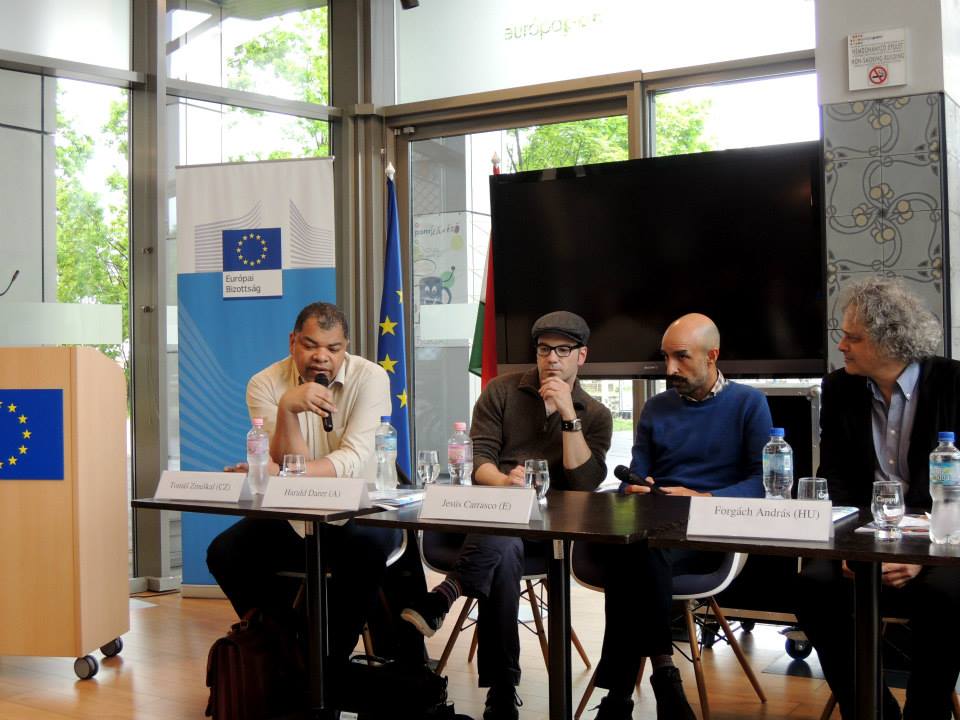
Tomáš Zmeškal speaking at the 21st International Book Festival in Budapest. Photo: Jaroslav Balvín.
I hope I’m not selling a pig in a poke when I say that those who are pushing hardest for the popularization of Czech literature are its translators. Among them we find a good few campaigners who spend a long time knocking on publishers’ doors with one book or another that they consider worthy of publication (whether it is a new or classic work) before one of them finally takes the bait and publishes it. Another factor that facilitates the publishing of Czech fiction in Hungary is the existence of all kinds of grants, which provides a strong argument for the translators making the rounds of publishing houses in this way.
The form of grant that Hungarian publishing houses are most familiar with is the one offered by the European Union. In the past, the grants to support the translation of Czech literature offered by the Ministry of Culture of the Czech Republic were mostly taken up by the ‘big publishing houses’ like Kalligram and Európa. Smaller players rarely applied for this subsidy. However, these days the structures of the publishing industry are undergoing a transformation and a growing number of smaller publishing houses are opening up to Czech fiction (e.g. Typotex, Galaktika, Noran Libro, Napkút etc.). Indeed, this was one of the main reasons for the launch of a project entitled Translate It! at the Budapest Czech Centre in the autumn of 2015.
Translate It!
The annual Translate It! exchange is a forum where Hungarian publishers can meet with translators. Translators pitch selected works of Czech literature from various genres (by classic and contemporary authors) directly to publishers in the form of a presentation and extracts from a translation. The first gathering, which was held on 12 October 2015 at the Budapest Czech Centre, also involved the personal participation of two Czech authors: Marie Iljašenko and Marek Toman. This year’s guest at the exchange, which is to take place on 5 October 2016, will be Petr Stančík. The first year has already borne fruit – twice as many publishers applied for the Ministry of Culture’s translation grant for the year 2016. And the results suggest that this will be a record year in terms of the number of Czech books published. Thanks to this gathering, a number of books found a publisher or obtained financial support. The real success stories include the Anthology of 19th Century Czech Poetry which was created at Eötvös Loránd University and edited by Veronika Hée, as well as A Winter Book about Love by Dora Kaprálová and Petr Stančík’s novel Mummy Mill. The translator of this last book, Gábor Hanzelik, described the meeting with publishers thus: “It is an unprecedented event which sets off a process that results in a Hungarian readership that is acquainted with Czech literature.”

Translate It! 2015. Photo: Czech Centre Budapest.
Thanks to this exchange of ideas and in connection with the presentation of the Czech Republic as part of the Book Festival in Budapest, a Translate It! brochure was created in the spring; it contains a representative sample of as yet untranslated works from contemporary Czech literature published in the last 15 years. This overview, which aims to encourage the creation of translations, includes authors who have already had some of their work published in Hungarian translation (e.g. Patrik Ouředník, Kateřina Tučková, Miloš Urban), and whose names are therefore known to Hungarian readers, as well as authors whose books are still awaiting translation. The majority of the more than sixty selected works (novels, collections of short stories or poems, essays, biographies, comics, books for children and young adults) have been awarded one of the prestigious literary prizes (State Prize for Literature, Magnesia Litera, Josef Škvorecký Prize), have had exceptionally positive reviews or have already been translated into other foreign languages and thus have a good chance of also appealing to the Hungarian reader. This is a unique guide for publishers and others in the trade, which they can use as the basis for decisions about which works to include in their publishing plan and where and how to secure financial support for the publishing of a Hungarian translation. Through this publication, the Budapest Czech Centre hopes primarily to raise interest in publishing Czech literature within the country. However, the guide is also a unique source of information about contemporary Czech literature and anyone with an interest in the subject can enjoy leafing through it. It was the work of sixteen translators, who wrote brief profiles of the individual authors (and illustrators) and translated short extracts from works they had chosen. In addition to bibliographical information, it also provides publishers with contact details for copyright holders and translators.
Lost in Babylon
How does someone actually become a translator of literary texts? At present there are two universities in Hungary offering courses in Czech Studies: at the University of Szeged those interested in Czech culture can obtain a Bachelor’s degree, and at the Eötvös Loránd University in Budapest, where the Czech Studies department celebrated the sixtieth year of its existence last year, those interested in the Czech language can pursue their studies all the way to PhD level. Unfortunately, the Czech Studies section at the Péter Pázmány Catholic University was closed down several years ago, even though a good few members of the current generation of young translators of Czech literature were educated there (e.g. Márton Beke, Borbála Csoma and Zsuzsanna Juhászné Hahn). In the Hungarian–Czech language combination, the teaching of translatology or literary translation is only carried out on a theoretical level (i.e. not at all); these two minor languages are not able to generate a sufficient number of students to make it worthwhile offering a specialism of this type. In most cases, therefore, translators learn the profession by themselves, trying it out first-hand in practice, since in the course of their university studies they have the opportunity to take part in at most a few specialist seminars focused on translation. And yet, despite all of this, for the time being there are still plenty of skilled translators from Czech!
This year, with the aim of establishing a tradition, the László Németh Translation Camp, focusing on literary translation, was held for the first time at the Folk High School in Lakitelek. “In individual workshops divided according to European languages (Czech, Croatian, Polish, Romanian, Serbian, Slovak, Slovenian, Ukrainian) the young translators participated in seminars where they worked under the guidance of renowned literary translators on works of fiction which had not yet been published in Hungarian translation. During the afternoon they then had the opportunity to attend specialist lectures on subjects like the literature of Central and Eastern Europe or the theory of translation. The translations which were created as part of the camp, together with the texts of the lectures, will be published in an anthology,” explains Andor Mészáros, a historian and Bohemist who, together with Csaba G. Kiss, was one of the professional guarantors of the camp.
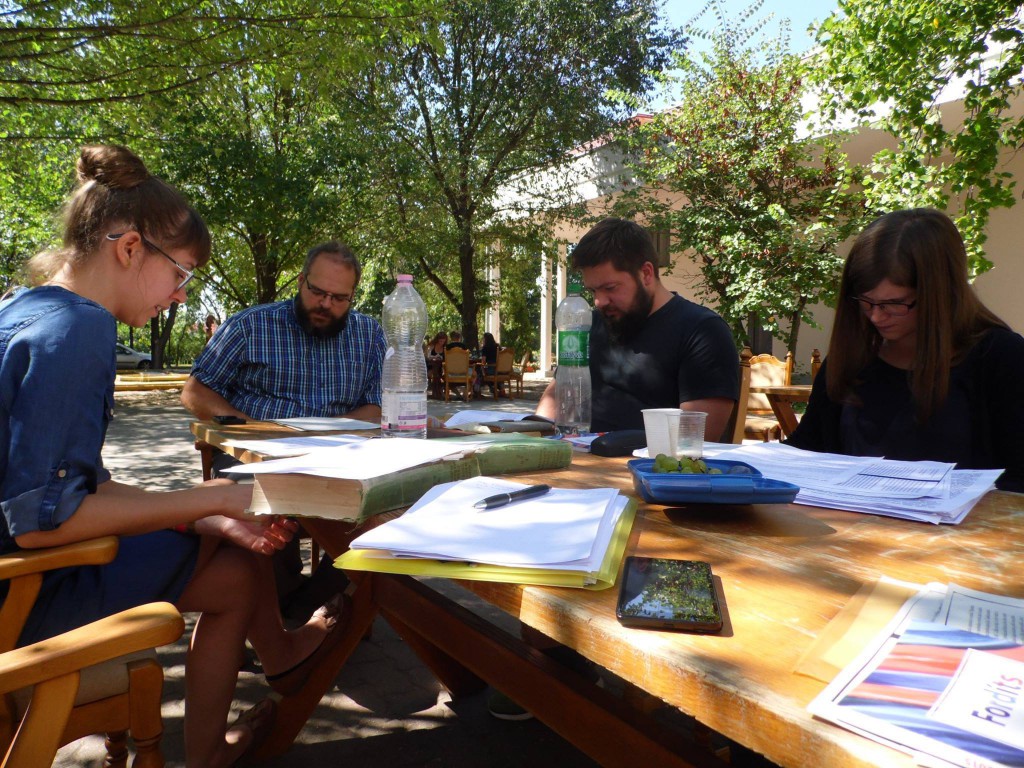
Translators at the László Németh Translation Camp. Photo: Czech Centre Budapest.
Grants and competitions for translation contribute significantly to allowing talented young translators to present themselves to the public. One of them is the Susanna Roth Award, which is open to translators up to forty years of age who have not yet had a translation of a book published. The prize is offered jointly by the Czech Centres and the Arts and Theatre Institute in Prague with the support of the Czech Ministry of Culture. The Hungarian winner in the first year was Zsuzsanna Juhászné Hahn, who has made a name for herself thanks in part to the prize. In April of this year, her translation of Petra Soukupová’s book To Disappear (Eltűnés) was published as part of the 23rd international book fair in Budapest, followed by her translation of Dora Kaprálová’s A Winter Book about Love (Egy férfi. Válasz Esterházy Péternek) in June. She is currently busy working on a translation of Jan Němec’s book A History of Light (A fény története), which is due to be launched in the spring of 2017. “As someone starting out as a translator, I would prefer it if the interest in Hungarian literature was as great as at the height of Hrabal’s fame. Those days will never return, but I think that the subsequent downturn is also a thing of the past. There are more and more publishing houses which are making the decision to publish Czech books, which is due in large part to grants provided through the Czech Ministry of Culture’s programme and the EU’s Creative Europe programme. Another encouraging aspect is the proactive approach taken by the Budapest Czech Centre, which issued its first publication at the Book Festival – the Translate It! brochure, which offers a Hungarian presentation of approximately sixty Czech books which are worthy of attention.” We believe that the translating career of the second year’s winner, Anna Steinbachné Bobok, is set to take off in a similar way.
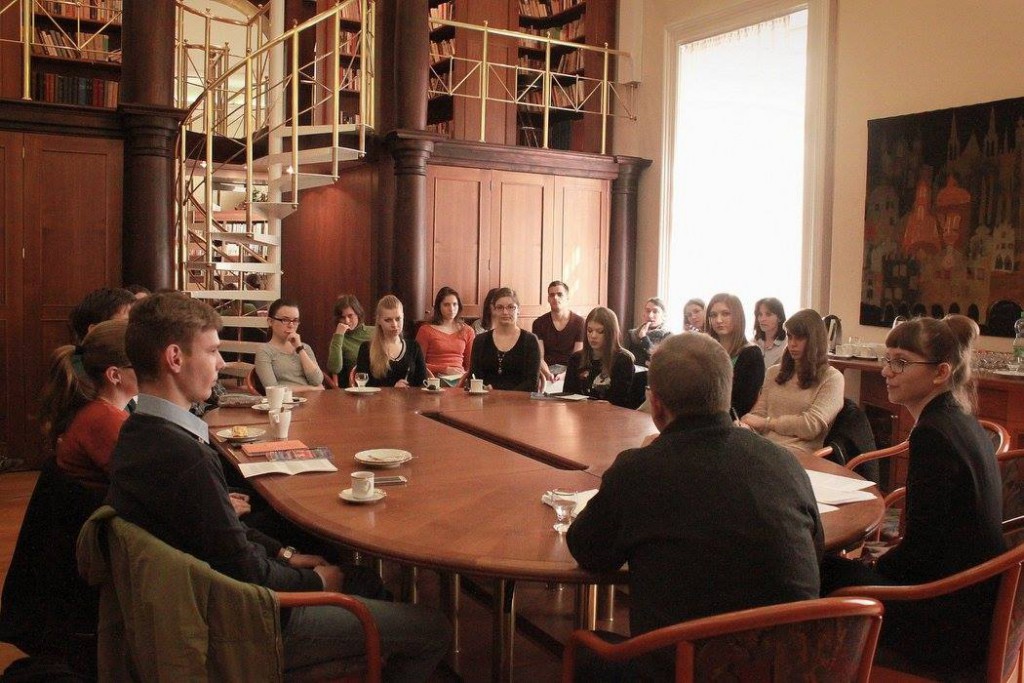
2016 Susanna Roth Award workshop. Photo: Czech Centre Budapest.
In this context we should also mention the competition held annually by the National Library of Foreign Literature (Országos Idegennyelvű Könyvtár, OIK) to mark the International Day of Languages, in which a different language takes centre stage each year. The only condition is that entrants have not yet had a translation published in book form. In 2011 a jury mainly consisting of poets assessed the translation of Karel Šiktanc’s poem The Second Day from the cycle Adam and Eve. The winner from 42 entrants was Sándor Szalay, and all the translations which came out of the competition were then published in a supplement to the September 2011 issue of the art and literature journal Napút.
It is possible to apply to the arts foundation Cédrus Művészeti Alapítvány on an ongoing basis for financial support for literary works or translations of them or related academic research. Twice a year, applicants can seek support for work of theirs which has not yet been published in book form. The work submitted is assessed by a jury composed of section heads from the journal Napút. The work of selected applicants is then published on the magazine’s website. Every year in November the foundation also holds a competition with a prize for the best piece of work, and the Napút publishing house then publishes some of the submitted works at its own discretion, sometimes even in book form.
The Mihály Babits Translation Grant is offered with the backing of the Ministry for Human Resources by the non-profit organization Magyar Alkotóművészeti Közhasznú Nonprofit Kft. Young translators can apply for financial support for the translation of a work of fiction (prose or poetry), a critical essay, or a paper from the field of sociology or philosophy, from any source language into Hungarian. The professional guarantor of the grant is the Petőfi Literary Museum, which is responsible for its implementation.
Another option for Bohemists, more specifically those who are already working as translators of Czech literature, is the Bohemistics Seminar, which this year also played host to four Hungarian participants. There is also the residency programme Prague City of Literature, in which one foreign writer or translator comes to Prague every second month for an eight-week stay.
Online vs offline
And where else can translations be published? In addition to book publishing, it is also worth discussing the various possibilities offered by online or offline publishing. Surfing the Slavonic waters, we come across the website Szláv Textus (Slavonic Text), established in 2013. In the form of a blog, it tells you “everything you wanted to know about Slavonic literature, films, music and culture.” The main authors of Czech-themed articles are Gábor Hanzelik and Radmila Hrisztov. The website also offers excerpts from literary works, most of which are from recently published books.
The literary portal Litera has been providing cultural content for fourteen years now. It is a public-service initiative whose main aim is to publish high-quality literary, critical and journalistic texts, i.e. reports from the web aimed at connoisseurs and lovers of literature. In 2005, the creative team behind this website were awarded the Pulitzer Prize. They regularly publish interviews and recommend articles, including reports from the field of Czech culture. The editor-in-chief of the website is Gabriella Nagy, who is also the curator of texts for the literary event Literature Night.
The objective of the Bábel Web anthology and its sister website Magyarul Bábelben (Hungarian in Babylon) is to allow users to sample literature from various countries around the world through translations into different languages. On this website we can read parallel excerpts of prose or poetry in the original language and in translation. The content of the website is the responsibility of volunteers – editors, authors and translators who post original texts or translations for which they have either obtained copyright permission or own the copyright themselves. Here we can find texts by the likes of Markéta Pilátová, Emil Hakl, Petr Bezruč and Jan Werich alongside each other.
The website Versum describes itself as an online platform for international poetry which follows contemporary trends, voices and directions in world poetry, as well as the most interesting contemporary foreign poets. It is an online literary magazine which gives readers an insight into contemporary international poetry and, in doing so, keeps revisiting the theme of the translation and translatability of poems from many different angles. The Czech poets whose poetry is cited here include Petr Hruška, Jan Skácel, Egon Bondy, Michael Lorence, Oldřich Mikulášek, Jiří Orten and Lenka Kuhar Daňhelová.
In addition to publishing poems, short stories or extracts from novels, printed literary journals also frequently bring out special issues dedicated to specific themes or the literature of a particular country. Special editions dedicated to Czech literature were published in 2012 by the poetry journal Parnasszus (Parnas), in 2004 by the journal Jelenkor (The Present), in 2007 by the journal Nagyvilág (The World), and in 2014 by the journal Helikon. In 2006 the journal Csodaceruza (The Magic Pencil) introduced its readers to the world of Czech children’s literature.
Another journal which deserves a mention is the Hungarian version of the cultural review Lettre Internationale, which sadly brought its 25 years of operations to a close this year with a symbolic final 100th edition. This literary quarterly provided writers and translators with an opportunity to publish their work; it played an important role as an intermediary between publishers and writers; it was a discussion forum and a common platform for the activities of various creative groups; and it helped to give the wider community of readers a grounding in Hungarian and international literature and culture. “Over the years we presented Czech authors in Lettre in the context of Visegrad. We regularly published excerpts from forthcoming translations by well-known translators (Zsuzsa V. Detre, Márton Beke, Borbála Csoma and István Vörös). One of our longstanding authors and translators, István Vörös, also recommended to us one of his students, Zsuzsanna Juhászné Hahn, with whom we went on to work with regularly. For a number of years Mrs Otília Barna, living in Prague, would recommend authors who had just published their first books and translate excerpts from their work for our journal. On the last occasion she provided us with an overview of the work of Filip Topol and wrote a major essay about him. The translator of Topol’s books was Péter Koleszár, who we got to know thanks to these translations, and – alongside Flóra Peťovská, who came to public attention through her translation of Dora Čechová’s work – he became one of our best translators from Czech,” commented the former editor-in-chief of the journal, Éva Karádi, on working with translators from Czech. “Often it’s the translators themselves who choose and recommend a work by a contemporary author they are interested in. Over the years we published overviews of contemporary Visegrad literature in the winter editions of Lettre, and on occasion we would also publish the work of writers participating in the Visegrad residency programme (e.g. Dora Kaprálová). Quite often, authors would come to the attention of publishers precisely because we had published some of their work in the journal.”
On to the festival!
The idea for the First Novel Festival (Európai Elsőkönyvesek Fesztiválja) was the brainchild of Mrs Éva Karádi. It is a gathering, organized as part of the International Book Festival in Budapest, with guest writers from across Europe who have already published their first novel or book of short stories, and who are destined for great things according to the critics. In past years, guests from the Czech Republic have included Viktorie Hanišová, Dora Čechova, Tomáš Zmeškal, Jaroslav Žváček, Petr Čichoň, Jan Nĕmec, Marek Šindelka, Markéta Pilátová, Jonáš Tokarský, David Zábranský, Jaroslav Pížl, Hana Andronikova, Petra Hůlová and Ivan Krejčí. It has also become customary for the most important literary/social journal Élet és Irodalom (Life and Literature) to publish a special supplement dedicated to first-time authors a week before this event. This allows readers to familiarize themselves with the works of these authors, who they can then meet in person at the panel discussions or numerous other events held as part of the Book Festival. The fact that many of the authors who had excerpts of their work read in Hungarian at the event went on to be published is testament to the success of this initiative. Examples include David Zábranský’s novel A Weakness for Every Other Beach (Mindig más strandra vágyik), translated by László G. Kovács and published by L’Harmattan as part of the Valahol Európában (Somewhere in Europe) series, Petra Hůlová’s novels Through Frosted Glass (Homályos üvegen át) and All This Belongs To Me (Nagyanyám emlékezete), and Marek Šindelka’s prose debut, The Mistake (Hiba), all of which were translated by Otília Barna and published by the Európa publishing house.
The International Book Festival in Budapest (Budapesti Nemzetközi Könyvfesztivál) is traditionally held in the second half of April and is only a year younger than the Prague trade fair Book World. After twenty years, the Czech Republic once again had a national stall at this event. The whole event was supported, coordinated and organized by the Budapest Czech Centre, with financial support from the Czech Ministry of Culture. The focus of the Czech participation was a stall displaying Czech books translated into Hungarian (which were also for sale), as well as outstanding, though as yet untranslated, Czech works, mainly fiction, children’s literature and comics. In addition to the Hungarian translation of Petra Soukupová’s To Disappear (Eltűnés), another two works by contemporary Czech authors were also published as part of the Budapest Book Festival: The Žítková Godesses by Kateřina Tučková (Üldözött istennők, translation by Borbála Csoma) and Darmata by Petr Hruška (Mondom neked, translation by István Vörös). Another Czech guest was Viktorie Hanišová, whose literary debut, Anežka, was presented at the trade fair as part of the First Novel Festival. There were also book signings and meetings with guest authors at a stall called #nemcsakhrabal (#notonlyhrabal). In a separate room, there was a discussion on the topic of contemporary Czech literature. Taking part in this, alongside the guest authors, were Radim Kopáč from the Ministry of Culture and István Vörös, the leading Hungarian Bohemist. There were also evening programmes: as part of the Night of the Small Booksellers some Czech literary treats were prepared – public readings of Czech literature by well-known Hungarians (e.g. the critic Géza Csákvári, the director Nemes Gyula and the young poet Kata Nagy) as well as a literary Pub Quiz (testing the participants’ knowledge of Czech literature).
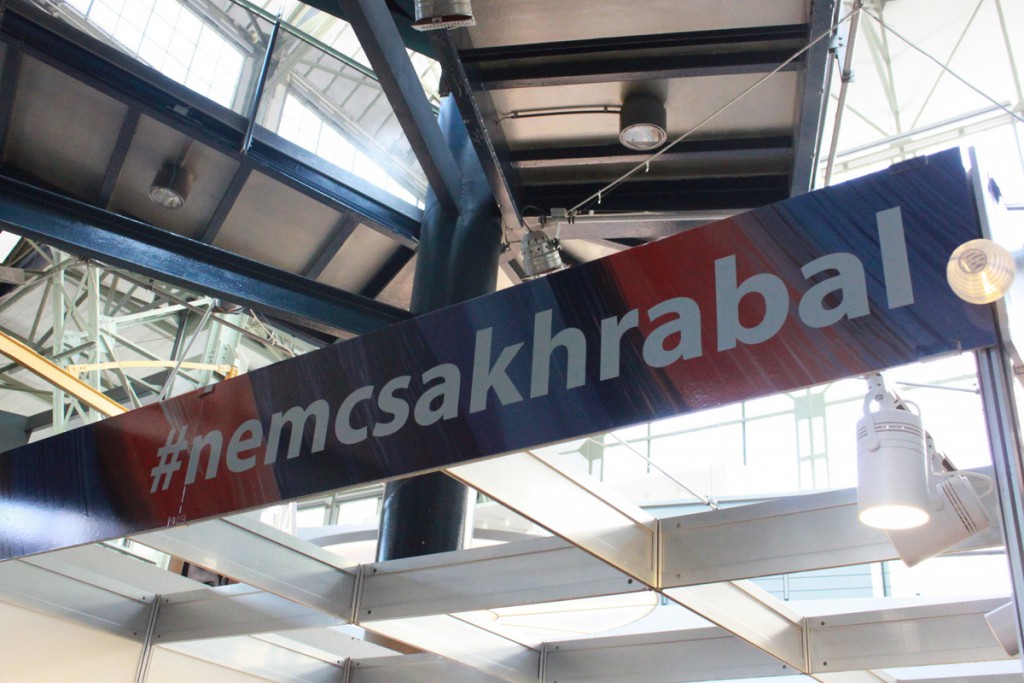
#notonlyhrabal. Photo: Czech Centre Budapest.
The older brother of the Book Festival is Book Week (Ünnepi Könyvhét), which celebrated its 87th anniversary in June of this year. It is always held in Budapest, though over time an increasing number of larger Hungarian towns have gradually begun to join in the event. For the past 15 years, the Days of Children’s Books (Gyermekkönyvnapok) have run in parallel with the Book Week. It might seem strange to organize two such large book events so close together, but the enormous interest from the public suggests otherwise. Outside the hectic pre-Christmas rush, it is during this period that the greatest number of new books is published and that they find their way into households. Whilst the Book Festival contains national stalls from various countries alongside the stalls of Hungarian publishers, at the Book Week the spotlight is on Hungarian literature. Nevertheless, three publishing houses brought out translations of Czech authors: the children’s book publishers Móra published Ivona Březinová’s novella The Boy and the Dog; Galaktika publishers, who focus mainly on science-fiction, published Petr Stančík’s fantastical novel Mummy Mill; and the publishers Typotex brought out A Winter Book about Love by Dora Kaprálová, inspired by the recent death of the novelist Péter Esterházy (who was in turn inspired by the aforementioned Bohumil Hrabal, to whom he dedicated his book The Book of Hrabal).
From the list of institutions which have helped to promote Czech and other foreign literature in Hungary, it is important to mention the largest literary museum in Hungary – the Petőfi Literary Museum (Petőfi Irodalmi Múzeum), which, as the Budapest host organization of the Visegrad Programme for Writers in Residence, provides successful applicants from the ranks of writers, poets, literary historians, journalists and translators with the opportunity to meet and work with each other and present their works to the public. The most recent Czech guests were Dora Kaprálová, Marie Iljašenko and Petr Maděra. This museum is also the organizer of the international literary Budapest Transfer Festival, which has been attended by guests from more than 20 countries between 2006 and 2015. As part of the festival, which is also supported by international cultural institutions, there are various literary programmes, meetings and public readings as well as organized walks around the city, light-art shows and concerts. The theme of the festival, which is different every year, determines the choice of guests – Kateřina Tučková was enticed to Budapest in 2011 by the theme of stories rewritten, Tereza Jandová in 2014 by the theme of urbanization, and Viktor Faktor, Alexandr Guha and Pavel Maurer in 2015 by the theme of gastronomy. Unfortunately, however, due to a lack of financing, this year’s festival, the 9th in the series, has had to be cancelled.
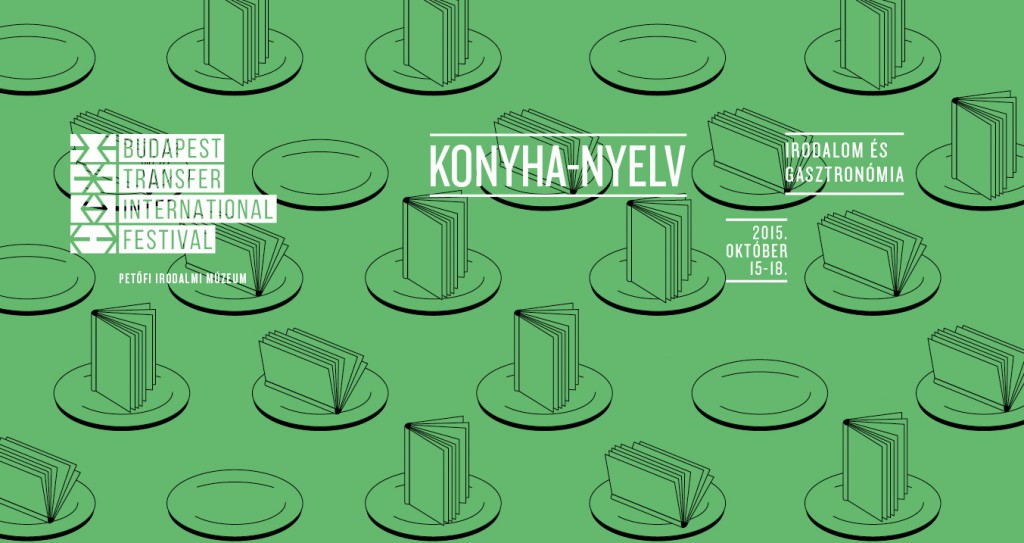
Budapest Transfer 2015
The question of how to get a book by a contemporary author to the readers themselves was one of the first to be asked by the new director of the Budapest Czech Centre, Lucie Orbók: “It’s all about the people. The promotion of a book or a contemporary author doesn’t just happen all by itself. It’s necessary to hold some kind of event which will attract a large number of people and present the literature in an unusual way. For example, through the Literature Night, which is the flagship of the Czech Centres and has expanded to include many European cities over a period of ten years. This year we were behind the event in Budapest and the results surprised even us: a total of 22 countries took part, and the city of Budapest got involved in the project as did the famous József Katona Theatre. There were queues everywhere and the average visitor age was around 35.” The Czech author chosen was Ondřej Neff with his dystopia The Darkness (Sötétség, translation: Otília Barna). An excerpt from the book was read out in a one-hundred-year-old subway train. Literature Night had been held twice before in Budapest (2011, 2012), in each case just before the book trade fair. Unfortunately, for many reasons, neither event was a success; both of them had low attendance figures and lacked coherence, which was why the Budapest EUNIC Cluster decided against continuing with the project. However, following this year’s successful restart, a date for next year’s event has already been set for 30 March 2017. The objective this time is to make contact with partners from regional towns and expand this unique event from the workshops of the Czech Centres to the whole of Hungary.
Is there life after Hrabal?
Unfortunately, in Hungary not much is known or written about contemporary Czech literature. However, this is not to say that books by contemporary authors are never published. It would appear that we are currently witnessing an upward trend. Research by the Czech Centre indicates that on average seven Czech books are published annually in Hungary. The most frequently translated living authors have been Patrik Ouředník, Jáchym Topol and Milan Kundera. In recent years the greatest successes have been Ouředník’s Europeana (translation by László G. Kovács) and Jan Novák’s novel So Far So Good (Eddig megvolnánk, translation by Márton Beke). Publishers view the publication of Czech and other foreign-language literature, in particular poetry, as a cultural mission for which they need help from various grant programmes. The books normally have a print run of up to 1,000 copies and are considered successful once half of these are sold. And what guarantees success? It is difficult to express this in universal terms, but in general it is about the right combination of the following components: the title, cover, subject matter, a visit by the author, good reviews and especially reader recommendations.
Translated by Graeme and Suzanne Dibble
Cover image: Detail from the cover of the Hungarian edition of A Winter Book about Love by Dora Kaprálová
[ ]
Flóra Peťovská (1986) studied Czech and Hungarian at the Eötvös Loránd University in Budapest where she also completed a post-graduate course in linguistics. She is writing her dissertation on literary onomastics. Peťovská works as the PR manager and librarian at the Budapest Czech Centre. In her work she focuses on the promotion of contemporary Czech literature and support of translations. Peťovská also teaches languages and translates technical and literary texts from Czech and Slovak.
